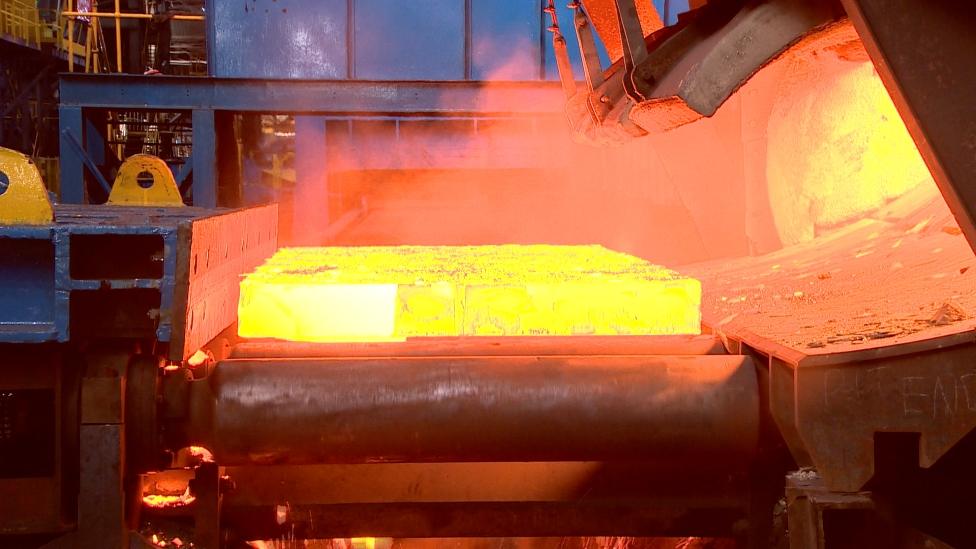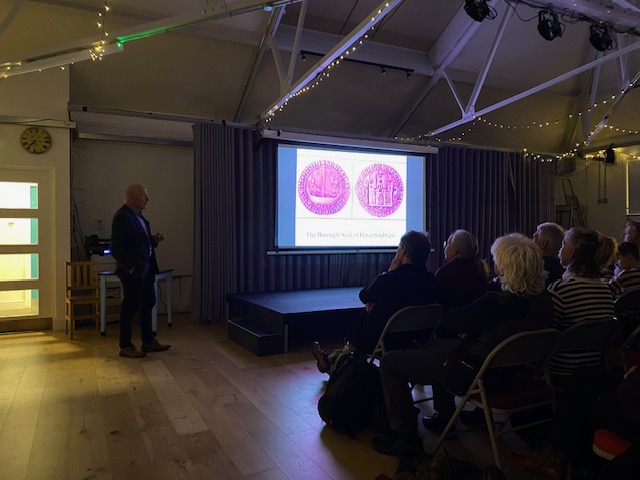News
‘Bitter disappointment’: Wales left out of UK steel rescue

Emergency bill to save Scunthorpe reignites anger over Port Talbot closure
WELSH politicians from across the political spectrum have accused the UK government of double standards, after emergency legislation was passed to protect a steelworks in England—while similar calls for support in Port Talbot were ignored.
The backlash follows the passing of a bill in Westminster aimed at saving the British Steel plant in Scunthorpe, where the UK’s last remaining blast furnaces are under threat. In contrast, Port Talbot’s blast furnaces were shut down in September 2024 with the loss of 2,800 jobs—without any such intervention.
Plaid Cymru’s Westminster leader Liz Saville-Roberts told Parliament: “Scunthorpe gets security. Port Talbot gets a pittance.”
She said the same emergency powers now being used to protect jobs in England could have been used to save blast furnace steelmaking in Wales, calling the lack of action for Port Talbot a “bitter, bitter disappointment.”

‘Wales treated as second-class’
The Port Talbot site is now transitioning to electric arc furnace technology, with a new plant expected by 2027. While this is seen as a move toward greener steel production, the method requires fewer workers—leading to widespread concern about long-term job losses and economic decline.
Plaid MS Luke Fletcher said Welsh steelworkers were promised support if Labour won power at both Westminster and the Senedd—but the final outcome looked very similar to what the Conservative government had already put forward.

Welsh Conservative MS Darren Millar said the UK Parliament should have recalled the Senedd during the Port Talbot crisis, just as it acted swiftly for Scunthorpe. “When crisis hits Wales, it’s tolerated. When it hits elsewhere, it becomes a national emergency,” he said.
Liberal Democrats: ‘Salt in the wound’
David Chadwick, MP for Brecon, Radnor and Cwm Tawe, said the decision to step in now for Scunthorpe while Port Talbot was left to suffer had enraged his constituents.
“It’s rubbing salt in the wound to now hear the government call primary steelmaking a strategic national asset—months after letting our own furnaces go cold,” he said.
“My grandfather worked the blast furnaces at Port Talbot. He would be heartbroken to see this level of inaction for Welsh workers.”
UK government defends its stance
Ministers have defended the difference in approach, arguing that the two sites face different circumstances.

Industry Minister Sarah Jones said the Labour government inherited a deal with Tata Steel that it could not reopen but improved upon. “There was a private investor willing to move forward in Port Talbot. That’s not the case in Scunthorpe,” she said.
Business Secretary Jonathan Reynolds added that Scunthorpe is the last site in the UK still producing virgin steel, making it strategically vital. “This is about national resilience. The world is changing, and we need the capability to produce primary steel for defence and key infrastructure.”
Still, for many in Wales, the damage is done.
One Port Talbot resident told The Herald: “It’s clear now. If this was happening in the South East of England, it would have been called a national crisis. But because it’s happening in Wales, it’s business as usual.”

Community
Christmas Spectacular fills St Davids Cathedral for unforgettable concert

Capacity crowd enjoys Britten masterpiece and light-hearted carols
A CAPACITY audience packed into St Davids Cathedral on Sunday (Dec 14) for the annual Christmas Spectacular, with hundreds filling the nave for one of the Cathedral’s most anticipated events of the year.
The evening opened with a serious and striking performance of Benjamin Britten’s Ceremony of Carols, delivered by the Cathedral Choir and accompanied by harpist Bethan Semmens. Choristers took on a series of demanding solos, earning warm applause from the audience.
Festive second half
The tone shifted after the interval as the Cathedral Choir and Vox Angelica returned for a lively programme of carols, Christmas favourites and crowd singalongs. The highlight of the evening was a colourful and humorous rendition of The Twelve Days of Christmas by the Vicars Choral and Choral Scholars, which had the audience laughing throughout.

Team effort behind the scenes
The event was led by Director of Music Laurence John, with Assistant Director of Music Ben Richards and music team member Arwel Davies supporting the performance. The Cathedral also thanked backstage staff and volunteers for helping to deliver a smooth and memorable evening.
The Christmas Spectacular is now a fixture of the Cathedral’s festive season and continues to draw large crowds, with Sunday’s concert selling out well in advance.
Community
HaverHub talk showcasing 40 key artefacts from Haverfordwest’s history

THOSE who attended “The History of Haverfordwest in 40 Artefacts” talk at HaverHub on 5 December 2025, said the event was “excellent”.
The talk offered a fascinating insight into the town’s past, including the remarkable fact that Haverfordwest was once a county within Pembrokeshire with its own currency and police force.

Below is a summary of the themes explored during the presentation, based on the museum’s collection and Dr Simon Hancock, who presented the talk’s expertise:
A journey through Haverfordwest’s story
Haverfordwest’s rich history is brought to life through objects held in its museum, illustrating the town’s development as a medieval port, administrative centre, and thriving market hub. The 40 artefacts selected for the presentation reveal centuries of Welsh life, local craftsmanship, political change, and moments of conflict—from early prehistory to the modern era.
Early and Medieval Life
- Neolithic standing stones & Iron Age slag – Traces of prehistoric occupation near Garn Turne.
- Roman artefacts – Finds demonstrating Roman presence in the wider area.
- Medieval tiles & effigies – Unearthed from the Augustinian Priory, showing craftsmanship and burial practices.
- Imported French floor tiles – Evidence of wealth and long-distance trade at the Priory.
- Jet chess piece – A rare object hinting at leisure activities and trade connections.
- Skeletal remains – Providing insight into high child mortality and possible injuries from the 1405 siege of the town.
- Warfare evidence – Including a skull bearing a puncture wound consistent with medieval combat.
Trade, Power and Governance
- Port and market artefacts – Reflecting Haverfordwest’s importance as one of Wales’s leading medieval ports.
- Banking materials – Linked to the historic Haverfordwest Bank.
- County corporate charters – Documents showing the town’s unique status as a county corporate in its own right, granted by Edward V in 1479.
Social and Cultural Life
- Local crafts and furniture – Examples of regional artistry and practical workmanship.
- Military uniforms and objects – Underlining the town’s long association with local defence forces.
- Music-related artefacts – Celebrating the town’s strong musical tradition.
- Cinema memorabilia – Particularly from the Palace Cinema, operating from 1913 onwards.
Where these stories live today
- Haverfordwest Town Museum – The primary home of many of these significant artefacts.
- HaverHub events – Where Dr Simon Hancock continues to present and interpret local history.
- Archaeological sites – Including the Priory ruins and recent excavations on Bridge Street.
Health
Hywel Dda Optometric Team wins at the Optometry Wales Awards 2025

HYWEL DDA UNIVERSITY HEALTH BOARD’S Optometric Team has been honoured with the Health Board Support Award at the Optometry Wales Awards 2025.
The award – sponsored by the Royal National Institute of Blind People (RNIB) – was presented by BBC Wales broadcaster Lucy Owen during a ceremony held in Cardiff on 29 November 2025.
Organised by Optometry Wales, the awards celebrate outstanding achievement across the eye-care sector in Wales. They recognise individuals and teams whose work goes above and beyond through clinical excellence, innovation, sustainability, mentoring, and service development.
Recognising leadership and support during major reform
Hywel Dda’s Optometric Team received the award for its significant support to practices across Carmarthenshire, Ceredigion, and Pembrokeshire during the rollout of the new national Optometry contract.
Their nomination highlighted the team’s strong leadership through the transition period and their commitment to ensuring practices were fully equipped to deliver high-quality eye health services under the new contract.
A key part of this work was developing new clinical pathways to ensure more patients could be safely managed in primary care. These pathways have improved access to timely local care and reduced the need for hospital appointments, ensuring people receive the right care in the right place.
Over 13,300 community appointments delivered
Since January 2024, more than 13,300 appointments have taken place in community settings using these enhanced pathways. Previously, many of these cases would have required referral to the hospital eye service. Now, an average of only 13.9% of patients require hospital referral — a significant shift demonstrating the positive impact of strengthened community-based care.
The team has also played a central role in developing Optometry Collaboratives, bringing together local practices to share ideas, improve services, and meet the needs of the local population.
“A fantastic achievement”
Rachel Absalom, Head of Optometric Services at Hywel Dda UHB, said: “We are incredibly proud to receive this award. It reflects the dedication of our committed team and the strong relationships we have built with practices across Carmarthenshire, Ceredigion and Pembrokeshire.
“The new pathways have made a real difference for patients, enabling more care to take place closer to home, and we are grateful to our colleagues in primary care who have worked with us to make this possible.”
Professor Philip Kloer, Chief Executive, added: “This is a fantastic achievement and recognises the vital work of our Optometric Team in supporting the rollout of the new national contract. Their leadership has strengthened local services and helped patients receive care closer to home.
“I’m also delighted to see several independent practices from our region recognised on the night, which demonstrates the exceptionally high standards of care delivered across Hywel Dda.”
Six regional wins on the night
A total of six awards were won across the Hywel Dda region. They included:
- Optometrist of the Year: Andy Britton (Specsavers Haverfordwest)
- Independent Practice of the Year: MN Charlton (Concept Eye Clinic, Fishguard)
- Dispensing / Contact Lens Optician of the Year: Samantha Houghton (Specsavers Haverfordwest)
- Sustainability Practice of the Year: Specsavers Haverfordwest
- Technology Practice of the Year: Specsavers Haverfordwest
Photo (left to right)
Lucy Owen (Presenter)
Sally Hodson (Optometric Advisor, HDUHB)
Rachel Absalom (Head of Optometric Services, HDUHB)
Hannah Rowlatt (External Engagement Officer, RNIB)
John Dixon (NHS Wales Engagement Manager, RNIB)
Jaynie Scourfield (Quality Assurance Manager – Primary Care, HDUHB)
Mary Owens (Head of Dental and Optometry, HDUHB)
-

 Crime6 days ago
Crime6 days agoPhillips found guilty of raping baby in “worst case” judge has ever dealt with
-

 Crime5 days ago
Crime5 days agoKilgetty scaffolder sentenced after driving with cocaine and in system
-

 Crime5 days ago
Crime5 days agoHousing site director sentenced after failing to provide breath sample following crash
-

 News23 hours ago
News23 hours agoDyfed-Powys Police launch major investigation after triple fatal crash
-

 Crime5 days ago
Crime5 days agoMotorist banned for three years after driving with cannabis in system
-

 Crime2 days ago
Crime2 days agoMan spared jail after baseball bat incident in Milford Haven
-

 Education4 days ago
Education4 days agoTeaching assistant struck off after asking pupil for photos of her body
-

 News7 days ago
News7 days agoJury retires tomorrow in harrowing Baby C rape trial



































